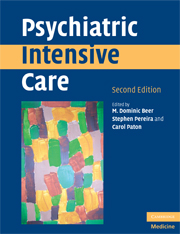Book contents
- Frontmatter
- Contents
- List of contributors
- Preface to second edition
- Preface to first edition
- Foreword
- Part I Therapeutic interventions
- 1 Psychiatric intensive care – development and definition
- 2 Management of acutely disturbed behaviour
- 3 De-escalation
- 4 Rapid tranquillisation
- 5 Pharmacological therapy
- 6 Psychological approaches to the acute patient
- 7 Psychological approaches to longer-term patients presenting with challenging behaviours
- 8 Seclusion – past, present and future
- 9 Restraint and physical intervention
- 10 The complex needs patient
- 11 Therapeutic activities within Psychiatric Intensive Care and Low Secure Units
- 12 Risk assessment and management
- Part II Interface issues
- Part III Management of the Psychiatric Intensive Care Unit/Low Secure Unit
- Index
- References
7 - Psychological approaches to longer-term patients presenting with challenging behaviours
from Part I - Therapeutic interventions
Published online by Cambridge University Press: 22 August 2009
- Frontmatter
- Contents
- List of contributors
- Preface to second edition
- Preface to first edition
- Foreword
- Part I Therapeutic interventions
- 1 Psychiatric intensive care – development and definition
- 2 Management of acutely disturbed behaviour
- 3 De-escalation
- 4 Rapid tranquillisation
- 5 Pharmacological therapy
- 6 Psychological approaches to the acute patient
- 7 Psychological approaches to longer-term patients presenting with challenging behaviours
- 8 Seclusion – past, present and future
- 9 Restraint and physical intervention
- 10 The complex needs patient
- 11 Therapeutic activities within Psychiatric Intensive Care and Low Secure Units
- 12 Risk assessment and management
- Part II Interface issues
- Part III Management of the Psychiatric Intensive Care Unit/Low Secure Unit
- Index
- References
Summary
Introduction
Severely disturbed behaviour posing a risk to the patient, the treating team or other patients can co-exist with or arise out of acute and chronic forms of psychosis, although a direct relationship is often obscure. These behaviours may settle as soon as the florid aspects of a psychosis dissipate; at other times they may come more sharply into focus as the psychosis improves. On many occasions the intensive care aspect is, de facto, more about the management of challenging behaviours than any psychotic condition. A wide range of behaviours may be construed as challenging. Effectively any behaviour sufficiently persistently disruptive or dangerous to the treatment setting might be defined as challenging. Common examples in psychiatric settings are:
non-compliance with medication
extreme withdrawal on the ward
physical violence to staff, other patients or property
sexual aggression
self-harm and suicide attempts
firesetting
persistent verbal abuse
Before considering psychological interventions it is important to note that the task of treating patients with a combination of psychotic and behavioural disorder is very frequently made more difficult by the fact that other dimensions of the patient's life may equally show impairment. Shepherd (1999) defines the ‘challenging behaviour group’ as having a combination of severe and intractable clinical symptoms, a range of behavioural problems and profound social dislocation. One might add problems of family conflict, degradation of living skills and perhaps disorders of personality.
Challenging behaviour within this conception is not a new phenomenon.
- Type
- Chapter
- Information
- Psychiatric Intensive Care , pp. 89 - 105Publisher: Cambridge University PressPrint publication year: 2008



